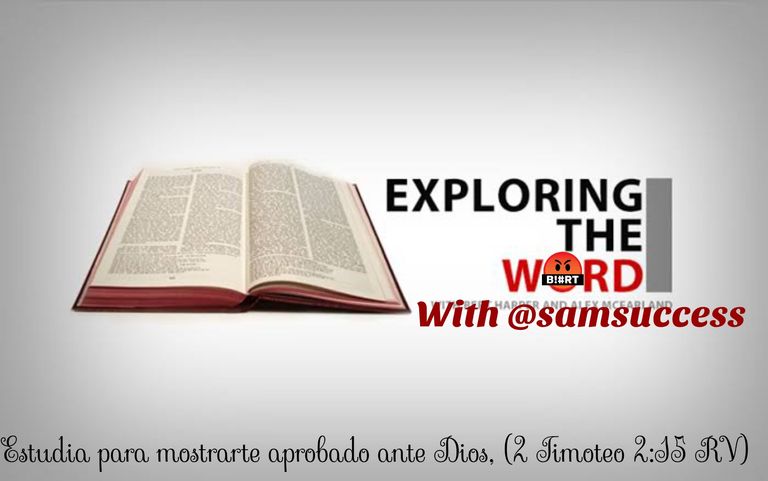It's a brand new day, good morning and welcome to a wonderful day.
Matt.15.1 - Then came to Jesus scribes and Pharisees, which were of Jerusalem, saying,
Matt.15.2 - Why do thy disciples transgress the tradition of the elders? for they wash not their hands when they eat bread.
Matt.15.3 - But he answered and said unto them, Why do ye also transgress the commandment of God by your tradition?
Matt.15.4 - For God commanded, saying, Honour thy father and mother: and, He that curseth father or mother, let him die the death.
Matt.15.5 - But ye say, Whosoever shall say to his father or his mother, It is a gift, by whatsoever thou mightest be profited by me;
Matt.15.6 - And honour not his father or his mother, he shall be free. Thus have ye made the commandment of God of none effect by your tradition.
Matt.15.7 - Ye hypocrites, well did Esaias prophesy of you, saying,
Matt.15.8 - This people draweth nigh unto me with their mouth, and honoureth me with their lips; but their heart is far from me.
Matt.15.9 - But in vain they do worship me, teaching for doctrines the commandments of men. (Matthew 15:1-9)
What is more grievous, to break a tradition made by men or a law given by God? The answer should be easy, right? Of course we would say that God’s laws are the only ones that matter, and yet can we honestly say our churches are free from “teaching as doctrines the precepts of men”?
Many churches today teach about a place called purgatory where people go if they are not ready to go Heaven. While purgatory is mentioned nowhere in scripture, churches still teach this doctrine as if it were. Those that do, explain their view the way Mitch Finley did by saying, “Revelation 21:27 says,

image source
‘But nothing unclean will enter [heaven].’…
It makes sense that most people, when they die, remain spiritually imperfect, and it also makes sense that no one can enter the state or condition called “Heaven” without being first purified of his or her remaining imperfections.
This is what “Purgatory” is for. It’s a state of being, if you will, or a process, that purifies the still imperfect person so he or she may then move on to the state or condition we call Heaven.” The problem with this doctrine is the weight of purification is placed on humanity, as if we could make ourselves perfect if given enough time.
Hebrews 9:22 clearly says,
“Indeed, under the law almost everything is purified with blood, and without the shedding of blood there is no forgiveness of sins.”

Also, verses 26-28 say,
“He has appeared once for all at the end of the age to put away sin by the sacrifice of himself. And just as it is appointed for men to die once, and after that comes judgement, so Christ, having been offered once to bear the sins of many, will appear a second time, not to deal with sin but to save those who are eagerly waiting for him.”
Scripture clearly declares that after death comes judgment – not a place to finish purifying. To believe in such a place makes the claim that Christ’s blood was not enough to wash us completely from our sins.
There are many other doctrines taught by man that do not appear in scripture. For instance, some churches teach that if you are not baptized, you will not get into heaven. Romans 10:9 says,
“If you confess with your lips that Jesus is Lord and believe in your heart that God raised him from the dead, you will be saved.”
Baptism is good and right, but it is an outward show of your inward commitment, not a means for salvation.
These two examples, and many others, have found a way into the teaching we look to as examples of how to live for Christ. We must be careful we do not fall into the same trap Jesus condemned in today’s reading when he said, “For the sake of your tradition, you have made void the word of God.”
The only way to keep ourselves from believing tradition over scripture is if we know scripture. Romans 12:2 tells us,
“Do not be conformed to this world but be transformed by the renewal of your mind, that you may prove what is the will of God, what is good and acceptable and perfect.”
No one expects a newborn Christian to know sound doctrine. That is why we are encouraged to seek the Lord, train ourselves, and grow in spiritual maturity.
As we do, we can then test (or prove) what we hear against what we know the Bible says. If you don’t yet know what the Bible says, google it, or use a Bible concordance. Search for scripture that contain the key word of the doctrine you are being taught and read for yourself what God says on the subject. Scripture is our weapon against lies. Let us learn to use it well.
Remain blessed.
[ESPAÑOL]
Es un nuevo día, buenos días y bienvenidos a un día maravilloso.
Mat.15.1 - Entonces se acercaron a Jesús unos escribas y fariseos que eran de Jerusalén, diciendo:
Mat.15.2 - ¿Por qué tus discípulos transgreden la tradición de los ancianos? porque no se lavan las manos cuando comen pan.
Mat.15.3 - Pero él respondió y les dijo: ¿Por qué también vosotros quebrantáis el mandamiento de Dios con vuestra tradición?
Mat.15.4 - Porque Dios mandó, diciendo: Honra a tu padre ya tu madre; y, El que maldiga al padre oa la madre, que muera de muerte.
Mat.15.5 - Pero vosotros decís: Cualquiera que dijere a su padre oa su madre: Es un regalo, en todo lo que pudieras aprovecharte de mí;
Mat.15.6 - Y no honre a su padre ni a su madre, será libre. Así habéis anulado el mandamiento de Dios por vuestra tradición.
Mat.15.7 - Hipócritas, bien profetizó de vosotros Isaías, diciendo:
Mat.15.8 - Este pueblo con su boca se acerca a mí, y con sus labios me honra; pero su corazón está lejos de mí.
Mat.15.9 - Mas en vano me honran, enseñando como doctrinas mandamientos de hombres. (Mateo 15:1-9)
¿Qué es más grave, quebrantar una tradición hecha por los hombres o una ley dada por Dios? La respuesta debería ser fácil, ¿verdad? Por supuesto, diríamos que las leyes de Dios son las únicas que importan y, sin embargo, ¿podemos decir honestamente que nuestras iglesias están libres de “enseñar como doctrinas los preceptos de los hombres”?
Muchas iglesias hoy enseñan acerca de un lugar llamado purgatorio donde la gente va si no está lista para ir al Cielo. Si bien el purgatorio no se menciona en ninguna parte de las Escrituras, las iglesias todavía enseñan esta doctrina como si lo fuera. Los que sí lo hacen, explican su punto de vista de la manera en que lo hizo Mitch Finley diciendo: “Apocalipsis 21:27 dice:

image source
‘Pero nada inmundo entrará [en el cielo]’…
Tiene sentido que la mayoría de las personas, cuando mueren, permanezcan espiritualmente imperfectas, y también tiene sentido que nadie pueda entrar en el estado o condición llamado “Cielo” sin ser purificado primero de las imperfecciones que le quedan.
Para eso es el “Purgatorio”. Es un estado de ser, por así decirlo, o un proceso, que purifica a la persona aún imperfecta para que pueda pasar al estado o condición que llamamos Cielo”. El problema de esta doctrina es el peso de la purificación que recae sobre la humanidad, como si pudiéramos perfeccionarnos con el tiempo suficiente.
Hebreos 9:22 dice claramente,
“Ciertamente, bajo la ley casi todo se purifica con sangre, y sin derramamiento de sangre no hay perdón de pecados.”

Además, los versículos 26-28 dicen:
“Él se presentó una vez para siempre por el sacrificio de sí mismo para quitar de en medio el pecado. Y así como está establecido que los hombres mueran una sola vez, y después el juicio, así Cristo, habiendo sido ofrecido una vez para llevar los pecados de muchos, aparecerá por segunda vez, no para tratar con el pecado, sino para salvar a los que están ansiosos por esperándolo."
Las Escrituras declaran claramente que después de la muerte viene el juicio, no un lugar para terminar de purificar. Creer en tal lugar afirma que la sangre de Cristo no fue suficiente para lavarnos completamente de nuestros pecados.
Hay muchas otras doctrinas enseñadas por el hombre que no aparecen en las Escrituras. Por ejemplo, algunas iglesias enseñan que si no estás bautizado, no entrarás al cielo. Romanos 10:9 dice,
“Si confiesas con tus labios que Jesús es el Señor, y crees en tu corazón que Dios le levantó de los muertos, serás salvo.”
El bautismo es bueno y correcto, pero es una muestra exterior de tu compromiso interior, no un medio para la salvación.
Estos dos ejemplos, y muchos otros, han encontrado un camino hacia la enseñanza que consideramos como ejemplos de cómo vivir para Cristo. Debemos tener cuidado de no caer en la misma trampa que Jesús condenó en la lectura de hoy cuando dijo: “Por causa de vuestra tradición, habéis invalidado la palabra de Dios”.
La única forma de evitar creer en la tradición sobre las escrituras es si las conocemos. Romanos 12:2 nos dice,
“No os conforméis a este mundo, sino transformaos mediante la renovación de vuestra mente, para que comprobéis cuál es la voluntad de Dios, lo que es bueno, aceptable y perfecto”.
Nadie espera que un cristiano recién nacido conozca la sana doctrina. Por eso se nos anima a buscar al Señor, formarnos y crecer en madurez espiritual.
Al hacerlo, podemos probar (o probar) lo que escuchamos contra lo que sabemos que dice la Biblia. Si aún no sabe lo que dice la Biblia, búsquelo en Google o use una concordancia bíblica. Busque escrituras que contengan la palabra clave de la doctrina que se le está enseñando y lea por sí mismo lo que Dios dice sobre el tema. La Escritura es nuestra arma contra las mentiras. Aprendamos a usarlo BIEN.
Siendo bendecido.







